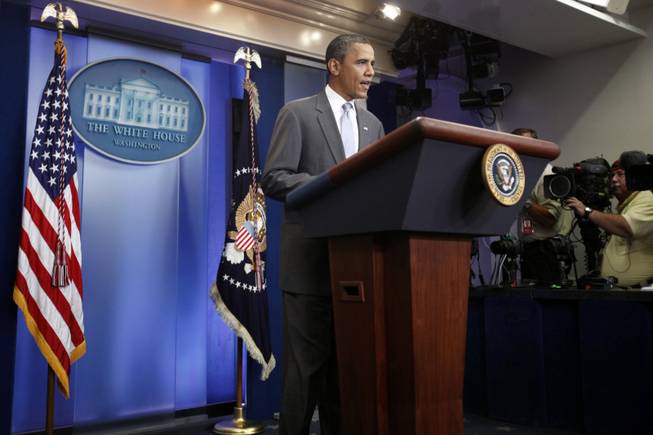
Associated Press
President Barack Obama speaks from the White House briefing room Sunday, July 31, 2011, in Washington, D.C., about a deal being reached to raise the debt limit.
Sunday, July 31, 2011 | 6:19 p.m.
Related stories
Senate leaders and President Barack Obama announced Sunday night that they have reached a deal to avoid default, just about two days before the deadline.
Now they just have to sell it to Congress.
“Sometimes it seems our two sides disagree on almost everything, but in the end, reasonable people were able to agree on this,” said Senate Majority Leader Harry Reid, the first to officially announce there was a deal. "My message to the world tonight is that this nation and this Congress are moving forward and we’re moving forward together.”
"At this point, I think I can say with a high degree of confidence that there is now a framework to review that will ensure significant cuts in Washington spending," said Republican Leader Mitch McConnell. "The United States of America will not, for the first time in our history, default on its national obligations."
The Senators left it to the president to outline the terms of the deal, which appear to be right in line with what has been reported throughout the weekend: the first $900 billion in increased borrowing authority will be balanced out by a $917 billion cut to discretionary spending, to be spread out over ten years. A bipartisan committee of congressional lawmakers would be set up and tasked with coming up with deeper deficit reductions by November of this year. The plan also contains a harsh incentive to compel Congress to take the committee’s proposal: if lawmakers can’t come up with a deficit-cutting plan, it sets off “tough cuts that both parties would find objectionable” across the board.
Under the plan, Congress will also take a vote on a constitutional amendment to balanced budget, and the president’s borrowing authority will be extended through the first months of 2013.
“Is this the deal I would have preferred? No,” Obama said, complaining of a process that was “messy” and took “far too long.”
But Obama threw the full weight of his office behind the plan.
“I want to urge members of both parties to do the right thing and support this deal with your votes,” he said. “It will allow us to avoid default, it will allow us to pay our bills, it will allow us to start reducing our deficit in a responsible way.”
It’s going to take the president, and many other lawmakers of similar mind, to pull enough lawmakers along to get this deal through the Congress in the next 48 hours.
While Senate leaders endorsed the plan in front of a national television audience, House leaders noticeably shied away from the public eye Sunday night — it’s in the House that this bill is going to be the toughest sell.
Both House Speaker John Boehner and Democratic Leader Nancy Pelosi scheduled meetings with their party conferences: the Republicans’ took place first, on Sunday night, while the Senate leaders made their announcement on the floor.
“There is nothing in this framework that violates our principles,” Boehner told his House Republicans, in a presentation that framed the whole deal under familiar framework of “cuts,” “caps” and “balances.”
“It’s all spending cuts. The White House bid to raise taxes has been shut down,” Boehner told Republicans. “And as I vowed back in May — when everyone thought I was crazy for saying it — every dollar of debt limit increase will be matched by more than a dollar of spending cuts. And in doing this, we’ve stopping a job-killing national default that none of us wanted.”
Not all House Republicans are expected to swallow Boehner’s argument whole, though.
For starters, the “balance” portion of the plan is not absolute: all that is required is a vote on a constitutional balanced budget amendment; while the Republican caucus’ preferred plan made passage a precondition for raising the debt ceiling.
Republicans were also upset that the make-up of the disciplinary trigger mechanism: about half of the automatic cuts in it would be to defense spending.
Utah Rep. Jason Chaffetz told reporters earlier Sunday evening that it the deal would be a “tough sell” for Boehner.
But it’s going to be a tough sell to House Democrats, too.
Democrats wanted to see some of the burden of deficit reduction borne by the wealthy, by ending tax breaks for corporations, luxury items, and top wage earners. There’s none of that in this bill (though those items could come up for review under the committee).
Democrats also object to the disciplinary trigger, though their objection is based on the fact that payments to Medicare providers will also be on the block if Congress can’t come up with a deal.
“Nada from million/billionaires; corp tax loopholes aplenty; only sacrifice from the poor/middle class?” tweeted Rep. Donna Edwards, a Democrat from Maryland who’s also in charge of recruiting 2012 candidates for the House Democrats’ campaign wing. “Shared sacrifice, balance? Really?”
"We're trading working Americans' livelihoods for #GOP radical votes," tweeted Rep. Raul Grijalva of Arizona, chairman of the House Progressive Caucus. “I’m a no.”
House Democrats' Leader Nancy Pelosi wouldn't commit to any assessment of her caucus Sunday night. "We all may not support it, or none of us may be able to support it," she told reporters outside her office. Pelosi is not grouping up House Democrats until Monday to hash out their position on the compromise plan.
Senate Democrats and Senate Republicans each scheduled meetings to discuss the particulars of the plan for Monday morning as well.

Join the Discussion:
Check this out for a full explanation of our conversion to the LiveFyre commenting system and instructions on how to sign up for an account.
Full comments policy